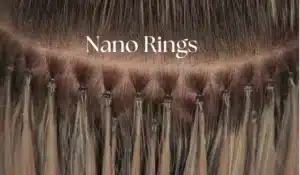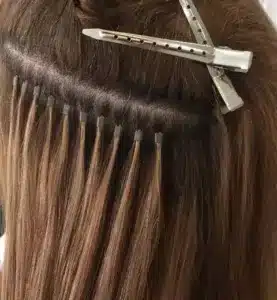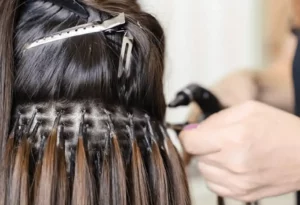Dry, rough hair extensions are frustrating for both stylists and clients—they ruin the luxury feel and affect overall results.
Hair extensions can become soft again by using gentle cleansing, deep conditioning, quality oils, and avoiding heat and harsh water. Regular salon care also helps maintain smooth texture.

Understanding the cause of dryness is the first step to restoring silky texture. Let’s walk through it step by step.
Why Do Hair Extensions Get Dry and Frizzy?
When extensions lose their softness, there’s always a root cause—and it’s usually avoidable.
Hair extensions get dry and frizzy from poor quality hair, UV exposure, hard water, sea water, or improper maintenance. Cuticle damage or missing cuticles make frizz worse.
Dive Deeper: Understand the Common Causes
Poor Hair Quality
Many cheap hair extensions, especially non-remy hair, have already gone through harsh acid stripping or are made from mixed-direction cuticle strands. This kind of hair cannot hold moisture well. As a result, they dry out quickly, become brittle, and frizz easily after only a few washes. When the cuticles are not aligned, the strands rub against each other, leading to split ends and a matted appearance.
Sun Exposure
Hair extensions, like natural hair, suffer from UV damage. Long-term exposure to sunlight degrades the keratin bonds in the hair shaft, causing the outer cuticle layer to weaken. Light-colored or bleached extensions are particularly vulnerable, as they have already undergone chemical processing. This leads to dullness, dryness, and a straw-like texture.
Hard Water
Many clients overlook the effect of water quality. Hard water, which contains minerals like calcium and magnesium, coats the surface of the hair, leaving behind residue. Over time, this prevents moisture and treatments from penetrating the strands. It also makes the hair rough to the touch and harder to manage.
Sea Water & Chlorine
Saltwater and chlorine both have drying properties. They dehydrate the hair, strip natural oils, and lift the cuticle layer. Chlorine, in particular, can react with hair color and cause discoloration or fading. Once the cuticle layer is lifted, the inner cortex is exposed and the hair becomes brittle and easily damaged.
Improper Maintenance
Most damage comes not from wearing extensions—but from how clients treat them. Overwashing, skipping conditioner, using high-heat tools without protection, or even brushing too roughly all lead to long-term fiber damage. This turns even good hair into a dry, unmanageable mess.
| Cause | What Happens to Hair |
|---|---|
| Poor Hair Quality | Becomes rough, tangles, sheds |
| UV/Sun | Cuticle lifts, color fades |
| Hard Water | Mineral buildup, dullness |
| Sea/Pool Water | Dries out, causes matting |
| Improper Care | Weakens strands, increases friction |

How to Make Hair Extensions Soft Again?
Softening extensions is possible—but it needs the right steps and consistency.
To make hair extensions soft again, use sulfate-free shampoo, deep moisturizing masks, light oils, and avoid harsh tools. Repair damage early and replace if necessary.
Dive Deeper: A Full Strategy for Restoring Softness
Buy High-Quality Extensions
Start with quality. Always choose full cuticle, single-donor human hair extensions from trusted manufacturers. At Hibiscus Hair, all our wefts are ethically sourced and crafted with cuticle-intact strands. This type of hair retains moisture longer, holds up to heat styling, and resists frizz. Lower-grade hair (e.g., mixed hair or acid-washed) can’t be softened with products alone—it simply doesn’t have the structure to last.
Daily Maintenance Tips
Every professional stylist knows that proper care is what keeps hair soft long-term. Recommend this regimen to clients:
- Use sulfate-free, moisture-rich shampoo no more than 2x a week.
- Follow up with deep conditioners, focusing on mid-lengths to ends.
- Apply leave-in conditioner or hydrating serum every day, especially before going out or sleeping.
- Brush gently with a loop brush or wide-tooth comb. Always detangle from ends upward.
- Avoid heat styling whenever possible. If needed, use a professional-grade heat protectant and keep tools under 180°C (356°F).
- At night, braid the hair loosely or wear a silk/satin bonnet to reduce friction and retain hydration.
Repair with Targeted Treatments
For extensions that already feel stiff or brittle, apply these remedies:
At-Home Remedies:
- Coconut oil or argan oil soak: Warm the oil slightly and apply generously to the ends. Leave it overnight under a bonnet and rinse in the morning.
- Deep mask treatments: Use salon-quality masks like Olaplex No. 3 or Kerastase Nutritive, leave them on for 20–30 minutes with a cap.
- Apple cider vinegar rinse: Mix 1 part ACV with 3 parts water. Rinse the hair to remove product buildup and restore pH balance.
Salon-Grade Fixes:
- Professional steam or infrared treatments can rehydrate and close the cuticle.
- If the ends are severely damaged, recommend trimming them and re-blending the weft.
- Suggest reinstalling with new bundles if over 70% of the weft has lost integrity.
Storage and Handling Tips
When not in use, hair extensions should be:
- Completely dry before storage
- Brushed and free of tangles
- Stored in silk or satin bags to avoid dust and friction
- Kept away from sunlight or extreme humidity
| Step | What It Does |
|---|---|
| Deep Conditioning | Restores elasticity, softness, and shine |
| Natural Oils | Smooths the cuticle and prevents dryness |
| Leave-In Products | Maintain moisture barrier throughout the day |
| Heat Control | Preserves the structural integrity of hair |
| Protective Styling | Reduces friction and moisture loss overnight |
| Proper Storage | Keeps hair fibers healthy while off-head |
Taking time to educate clients on proper care habits increases their satisfaction and boosts your brand’s credibility. Always remind them that maintenance is what keeps luxury extensions luxurious.

Conclusion
High-quality hair, proper care, and consistent moisture will keep extensions soft and silky—even after repeated use.





